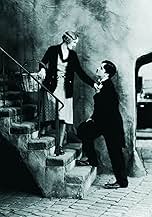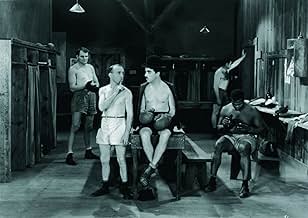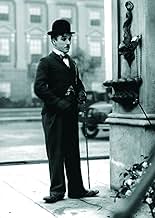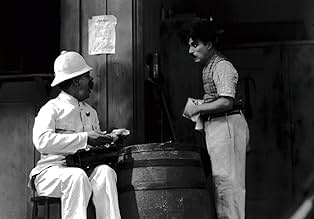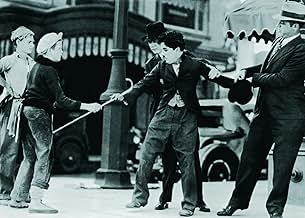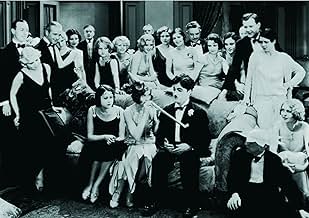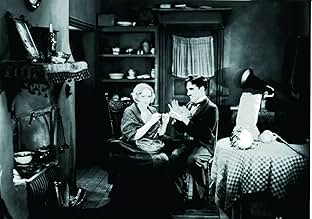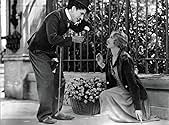Con la ayuda de un hombre adinerado, borracho e imprevisible, un ingenuo vagabundo que se ha enamorado de una florista ciega intenta conseguir dinero para poder proporcionarle ayuda médica.Con la ayuda de un hombre adinerado, borracho e imprevisible, un ingenuo vagabundo que se ha enamorado de una florista ciega intenta conseguir dinero para poder proporcionarle ayuda médica.Con la ayuda de un hombre adinerado, borracho e imprevisible, un ingenuo vagabundo que se ha enamorado de una florista ciega intenta conseguir dinero para poder proporcionarle ayuda médica.
- Dirección
- Guionistas
- Elenco
- Premios
- 6 premios ganados en total
Charles Chaplin
- A Tramp
- (as Charlie Chaplin)
Al Ernest Garcia
- The Millionaire's Butler
- (as Allan Garcia)
Johnny Aber
- Newsboy
- (sin créditos)
Jack Alexander
- Boxing Match Spectator
- (sin créditos)
T.S. Alexander
- Doctor
- (sin créditos)
Victor Alexander
- Superstitious Boxer
- (sin créditos)
Albert Austin
- Street Sweeper
- (sin créditos)
- …
Harry Ayers
- Cop
- (sin créditos)
Eddie Baker
- Boxing Fight Referee
- (sin créditos)
Henry Bergman
- Mayor
- (sin créditos)
- …
Edward Biby
- Nightclub Patron
- (sin créditos)
Betty Blair
- Woman at Center of Table in Restaurant
- (sin créditos)
Buster Brodie
- Bald Party Guest
- (sin créditos)
Jeanne Carpenter
- Diner in Restaurant
- (sin créditos)
- Dirección
- Guionistas
- Todo el elenco y el equipo
- Producción, taquilla y más en IMDbPro
Resumen
Reviewers say 'City Lights' is celebrated for its blend of comedy and pathos, showcasing Charlie Chaplin's iconic Tramp character in a poignant love story with a blind flower girl. The film is praised for its masterful physical comedy, expressive acting, and memorable scenes, particularly the boxing match and the emotional finale. Chaplin's direction, composition of the score, and the film's historical significance are frequently highlighted. However, some reviewers note that the silent format and slow pacing may challenge modern audiences. The themes of love, selflessness, and social commentary resonate deeply, making 'City Lights' a timeless classic.
Opiniones destacadas
Charlie Chaplin's "City Lights" contains a blend of humor and humanity that make it memorable for everyone who watches it. Although made very much in the old-fashioned silent film tradition, much of it is timeless, too.
After a few minutes of slapstick at the beginning, Charlie's "little tramp" character makes two acquaintances. He meets a blind girl selling flowers, who mistakes him for a rich man, and the two become very fond of each other. Then he meets a real millionaire, who is drunk, depressed, and about to commit suicide. In a comic scene, the tramp persuades the millionaire not to go through with it, making himself a devoted friend.
The tramp soon learns that there is an operation that could give the girl her sight, and tries to think of some way he could help. His scenes with the girl and her grandmother are moving, while his determination to help lead him into some comic escapades - his attempt to win money in a boxing match being particularly funny, and one of Chaplin's best comic pieces. Meanwhile, when his millionaire friend is drunk, he dotes on the tramp, but when sober he forgets who the tramp is, leading to more amusing scenes and occasional trouble for Charlie.
All of the comedy leads up to a finale that is one of the best-remembered scenes in any film. "City Lights" shows the power of the camera in the hands of a master, who without words can move his audience or make them laugh. Anyone who appreciates good cinema should see it at least once.
After a few minutes of slapstick at the beginning, Charlie's "little tramp" character makes two acquaintances. He meets a blind girl selling flowers, who mistakes him for a rich man, and the two become very fond of each other. Then he meets a real millionaire, who is drunk, depressed, and about to commit suicide. In a comic scene, the tramp persuades the millionaire not to go through with it, making himself a devoted friend.
The tramp soon learns that there is an operation that could give the girl her sight, and tries to think of some way he could help. His scenes with the girl and her grandmother are moving, while his determination to help lead him into some comic escapades - his attempt to win money in a boxing match being particularly funny, and one of Chaplin's best comic pieces. Meanwhile, when his millionaire friend is drunk, he dotes on the tramp, but when sober he forgets who the tramp is, leading to more amusing scenes and occasional trouble for Charlie.
All of the comedy leads up to a finale that is one of the best-remembered scenes in any film. "City Lights" shows the power of the camera in the hands of a master, who without words can move his audience or make them laugh. Anyone who appreciates good cinema should see it at least once.
City Lights is simply put one of the best movies out there. Every scene is classic and had a huge impact on the history of film-making. Chaplin's last 'silent' film tells the story of a poor little man the tramp played by Chaplin who falls in love with a blind flower girl. He becomes friends with a wealthy man who constantly tries to commit suicide. The man only recognizes the tramp character when he is drunk. To impress the flower girl the tramp uses the man's wealth to make her fall in love with him. The only problem is that when the man is sober he doesn't recognize the tramp anymore. On top of this the flower girl has to pay 22 dollars of rent or she will be thrown out of her apartment. Now the tramp desperately seeks for jobs in the city to help his love. Out of this simple plot great comedy and heart breaking moments come forth.
The outcome of the movie is to almost all people known. It is regarded as one of the best endings ever taped on film. The movie itself still is masterpiece more than 70 years after it's release. I personally rate this as Chaplin's second best I have seen so far. My favorite remains The Gold Rush. Still this movie gets 5/5 stars from me.
The outcome of the movie is to almost all people known. It is regarded as one of the best endings ever taped on film. The movie itself still is masterpiece more than 70 years after it's release. I personally rate this as Chaplin's second best I have seen so far. My favorite remains The Gold Rush. Still this movie gets 5/5 stars from me.
This is my favorite Chaplin film, but I don't want that to diminish his other work, either. MODERN TIMES was an outstanding work of social satire, THE GOLD RUSH was great slapstick, and even the largely-neglected MONSIEUR VERDOUX strikes a certain unforgettable tone. Chaplin didn't make a bad movie, and I'm not even sure that CL is his best, exactly. But it IS my favorite, if only for the ending.
That ending has been the subject of much comment here. I think it's a masterpiece in a single scene. Chaplin's little tramp has never seemed less like a character and more like a living, breathing human being. It's a monument to understated sentimentality.
To me, the rest of the film exists largely to set the context for that one magnificent piece of celluloid. Yes, the boxing scene is great, and the scene where he rescues the millionaire is also wonderful, but it's that ending that makes us all love this movie.
That ending has been the subject of much comment here. I think it's a masterpiece in a single scene. Chaplin's little tramp has never seemed less like a character and more like a living, breathing human being. It's a monument to understated sentimentality.
To me, the rest of the film exists largely to set the context for that one magnificent piece of celluloid. Yes, the boxing scene is great, and the scene where he rescues the millionaire is also wonderful, but it's that ending that makes us all love this movie.
Once again Chaplin plays his famous creation, the beloved Tramp
The noble Little Fellow meets and falls in love with a blind flower girl
She assumes he is wealthy man and offers him a flower, which he attentively accepts with his last penny
One night by chance he rescues a drunken millionaire from drowning The rich gentleman becomes a generous friend when drunk but doesn't recognize the tramp when sober Chaplin takes the blind girl under his wing, and takes flight with the millionaire's money to cure her blindness
"City Lights" engaged a true genius in a graceful and touching performance which arouses profound feelings and joy with great simplicity of style and tragic tale Each scene was the result of hard-working detail and planning
One night by chance he rescues a drunken millionaire from drowning The rich gentleman becomes a generous friend when drunk but doesn't recognize the tramp when sober Chaplin takes the blind girl under his wing, and takes flight with the millionaire's money to cure her blindness
"City Lights" engaged a true genius in a graceful and touching performance which arouses profound feelings and joy with great simplicity of style and tragic tale Each scene was the result of hard-working detail and planning
City Lights (1931)
**** (out of 4)
Charlie Chaplin returns as The Tramp and this time he falls in love with a blind girl (Virginia Cherrill) and sets out to help her. The Tramp eventually meets a suicidal drunk (Harry Myers) and their friendship leads to what might eventually help the girl he loves.
Chaplin made great films before and after CITY LIGHTS but for my money this here is his greatest film as well as one of the greatest films ever made. Not only is it one of the funniest movies ever made but I'd also argue that it's one of the greatest love stories, if not the greatest. It really says a lot when a movie can conqueror two genres at one time but CITY LIGHTS is simply one of the greatest movies ever made.
I think it says a lot that you get one classic scene after another and there's really not a weak spot to be found here. Being 1931 it took some real guts for Chaplin to deliver a silent film and I think he knew that he had to deliver something special because people had moved onto sound. He certainly delivered something special as this here was easily the funniest film he had made up to this point. The opening sequence with the introduction of The Tramp was priceless and we got one hilarious scene after another from that point.
The scenes with the drunk are downright hilarious as is another scene where The Tramp is trying to eat but without much success. The cigar sequence is a masterpiece as is the by the water. In fact, the story between The Tramp and the drunk would have made a terrific movie on its own. Just like the stuff with The Tramp and the blind girl would have made a perfect film. What's so special is that you get both stories wrapped up in one and it really delivers.
Chaplin played The Tramp countless times but he was never better than he is here. Just check out the timing in countless scenes including the boxing match and you can't help but be impressed with the actor. Myers also deserves a lot of credit as the drunk as his timing has to match that of Chaplin throughout and the two men do a wonderful job together. Then you've got Cherrill who wasn't a professional actor but the director makes her shine throughout.
CITY LIGHTS contains one great scene after another and all of the laughs lead up to one of the most powerful endings in film history. There's really not enough great things that can be said about this film as it continues to get better with each passing year.
**** (out of 4)
Charlie Chaplin returns as The Tramp and this time he falls in love with a blind girl (Virginia Cherrill) and sets out to help her. The Tramp eventually meets a suicidal drunk (Harry Myers) and their friendship leads to what might eventually help the girl he loves.
Chaplin made great films before and after CITY LIGHTS but for my money this here is his greatest film as well as one of the greatest films ever made. Not only is it one of the funniest movies ever made but I'd also argue that it's one of the greatest love stories, if not the greatest. It really says a lot when a movie can conqueror two genres at one time but CITY LIGHTS is simply one of the greatest movies ever made.
I think it says a lot that you get one classic scene after another and there's really not a weak spot to be found here. Being 1931 it took some real guts for Chaplin to deliver a silent film and I think he knew that he had to deliver something special because people had moved onto sound. He certainly delivered something special as this here was easily the funniest film he had made up to this point. The opening sequence with the introduction of The Tramp was priceless and we got one hilarious scene after another from that point.
The scenes with the drunk are downright hilarious as is another scene where The Tramp is trying to eat but without much success. The cigar sequence is a masterpiece as is the by the water. In fact, the story between The Tramp and the drunk would have made a terrific movie on its own. Just like the stuff with The Tramp and the blind girl would have made a perfect film. What's so special is that you get both stories wrapped up in one and it really delivers.
Chaplin played The Tramp countless times but he was never better than he is here. Just check out the timing in countless scenes including the boxing match and you can't help but be impressed with the actor. Myers also deserves a lot of credit as the drunk as his timing has to match that of Chaplin throughout and the two men do a wonderful job together. Then you've got Cherrill who wasn't a professional actor but the director makes her shine throughout.
CITY LIGHTS contains one great scene after another and all of the laughs lead up to one of the most powerful endings in film history. There's really not enough great things that can be said about this film as it continues to get better with each passing year.
¿Sabías que…?
- TriviaChaplin re-shot the scene in which the Little Tramp buys a flower from the blind flower-girl 342 times, as he could not find a satisfactory way of showing that she thought the mute tramp was wealthy.
- Errores(at around 50 mins) When the man swallows part of the Tramp's soap and starts spraying bubbles, the tube used to spray the bubbles is clearly visible behind him.
- Citas
The Tramp: You can see now?
A Blind Girl: Yes, I can see now.
- Versiones alternativasAbout seven minutes of footage of Georgia Hale playing the flower girl exists and is included in the 2003 DVD release. The footage was shot during a brief period when the actress originally cast to play the character had been fired and replaced with Hale, but Charles Chaplin was forced to resume filming with the original actress due to the amount of film already shot.
- ConexionesEdited into Histoire(s) du cinéma: Fatale beauté (1994)
Selecciones populares
Inicia sesión para calificar y agrega a la lista de videos para obtener recomendaciones personalizadas
Detalles
- Fecha de lanzamiento
- País de origen
- Sitio oficial
- Idiomas
- También se conoce como
- City Lights
- Locaciones de filmación
- Productora
- Ver más créditos de la compañía en IMDbPro
Taquilla
- Presupuesto
- USD 1,500,000 (estimado)
- Total en EE. UU. y Canadá
- USD 19,181
- Fin de semana de estreno en EE. UU. y Canadá
- USD 9,102
- 8 jul 2007
- Total a nivel mundial
- USD 55,154
- Tiempo de ejecución
- 1h 27min(87 min)
- Color
- Mezcla de sonido
Contribuir a esta página
Sugiere una edición o agrega el contenido que falta

